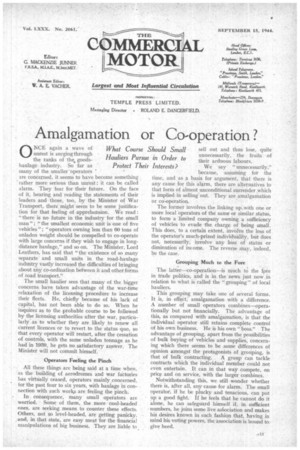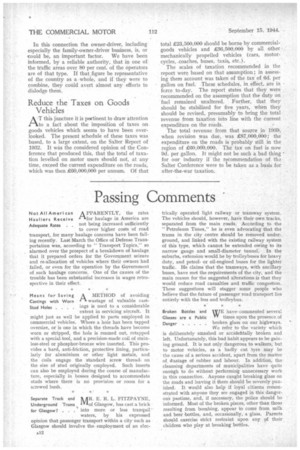Amalgamation or Co-operation?
Page 13

Page 14

If you've noticed an error in this article please click here to report it so we can fix it.
ONCE again a wave of unrest is surging through , the ranks of the, goodsnauiters Pursue haulage industry. So far as Protect Their many of the smaller-operators ' are concerned, it seems to have become something ' rather more serious than unrest ; it can be called alarm. They fear for their future. On the face of it, hearing and reading the statements of their leaders and those, too, by the Minister of War Transport, there might seem to be some justification for that feeling of apprehension. We read : "there is no future in the industry for the small man " ; "the smallest economic unit is one of five vehicles" ; "operators owning less than 60 tons of unladen weight should be compelled to co-operate with large concerns if they wish to engage in longdistance haulage," and so on. The Minister, Lord Leathers, has said that "the existence of so many separate and small units in the road-haulage industry vastly increased the difficulties of bringing about any co-ordination between it and other forms of road transport."
The small haulier sees that many of the bigger concerns have taken advantage of the war-time relaxation of the licensing procedure to increase their fleets. He, chiefly because of his lack of capital, has not been able to do so. When he inquires as to the probable course to be followed by the licensing authorities after the war, particularly as t& whether they are likely to renew all current licences or to revert to the status quo, so that every operator will restart, after the cessation of controls, with the same unladen tonnage as he had in 1939, he gets no satisfactory answer. The Minister will not commit himself.
What Course S
Operators Feeling the Pinch All these things are being said at a time when, as the building of aerodromes and war factories has virtually ceased, operators mainly concerned. for the past four to six years, with haulage in connection with such works are feeling the pinch.
In consequence, many small operators are worried. Some of them, the more cool-headed ones, are seeking means to counter these effects. Others, not so level-headed, are getting panicky. and, in that state, are easy meat for the financial manipulations of big business. They are liable to sell out and thus lose, quite unnecessarily, the fruits of their arduous labours.
We say "unnecessarily," because, assuming for the time, and as a basis for argument, that there is any cause for this alarm, there are alternatives to that form of almost unconditional surrender which is implied in selling out. They are amalgamation or co-operation.
The former involves the linking up_with one or more local operators of the same or similar status, to form a limited company owning a sufficiency of vehicles to evade the charge of being small. This does, to a certain extent, involve the loss of the operator's much-prized individuality, but does not, necessarily, involve any loss of status or diminution of income. The reverse may, indeed, be the case.
Grouping Much to the Fore The latter—co-operation—is much to the fpre in trade politics, and is in the news just now in relation to what is called the "grouping" of local hauliers.
This grouping may take one of several forms. It is, in effect; amalgamation with a difference. A number of small operators combines—operationally but not financially. The advantage of this, as compared with amalgamation, is that the individual operator still retains complete control of his own business. He is his own "boss." The advantage of grouping, apart from the possibilities of bulk buying of vehicles and supplies, concerning which there seems to be some differences of opinion amongst the protagonists of grouping, is that of bulk contracting. A group can tackle' contracts which the individual member could not even entertain. It can in that way compete, on price and on service, with the larger combines.
Notwithstanding this, we still wonder whether there is, after all, any cause for alarm. The small operator, if he be plucky and tenacious, can put up a good fight. If he feels that he cannot do it alone, he can safeguard himself if, in sufficient numbers, he joins some live asfiociation and makes his desires known in such fashion that, having in mind his voting powers, the association is bound to give heed. In this connection the owner-driver, including especially the family-owner-driver business, is, or could be, an important factor. We have been informed, by a reliable authority, that in one of the traffic areas over 80 per cent. of the operators are of that type. If that ,figure be representative of the country as a ,whole, and if they were to combine, they could avert almost any efforts to dislodge them.
Reduce the Taxes on Goods Vehicles
AT this juncture it is pertinent to draw attention to a fact about the imposition of taxes on goods vehicles which seems to have been overlooked. The present schedule of these taxes was based, to a large extent, on the Salter Report of 1932. It was the considered opinion of the Conference that produced this, that the total of taxation levelled on motor users should not, at any time, exceed the current expenditure on the roads, which was then £60,000,000 per annum. Of that total £23,500,000 should be borne by commercialgoods vehicles and £36,500,000 by all other , mechanically propelled vehicles (cars, motor • cycles, coaches, buses, taxis, etc.). The scales of talcation recommended in the report were based on that assumption; in assessing them account was taken of the tax of 6d. per gallon on fuel. These schedules, in effect, are in • force to-day. The report states that they were recommended on the assumption that the duty on fuel remained unaltered. Further, that they should be stabilized for five years, when they should be revised, presumably to bring the total revenue from taxation into line with the current expenditure on the roads.
The total -revenue from that source in 1939, when revision was due, was £87,000,000; the expenditure on the roads is probably still in the region of £60,00,000. The tax on fuel is now 9d. per gallon. It might not be such a bad thing ' for our industry if the recommendation of tha Salter Conference were to be taken as a basis for after-the-war taxation.




















































